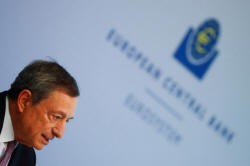|
Exclusive: ECB
policymakers agreed on stimulus cut at meeting - sources
 Send a link to a friend
Send a link to a friend
 [September 08, 2017]
FRANKFURT (Reuters) - European
Central Bank policymakers meeting on Thursday were in broad agreement
their next step would be to cut bond purchases, with four options under
consideration, two sources with direct knowledge of the discussion said. [September 08, 2017]
FRANKFURT (Reuters) - European
Central Bank policymakers meeting on Thursday were in broad agreement
their next step would be to cut bond purchases, with four options under
consideration, two sources with direct knowledge of the discussion said.
Possibilities discussed by the ECB included - but are not limited to -
cutting monthly assets buys from 60 billion euros now to 40 billion
euros a month or 20 billion euros from the start of next year, with
extension options including 6 months or 9 months, said the sources, who
asked not to be named.
Any decision, likely come in October, should also be backed by a broad
consensus, the sources said, with one suggesting a compromise could be
found for setting monthly purchases somewhere between 20 billion euros
and 40 billion euros.
This showed that policymakers are keen to avoid the repeat of the public
discord that has marred the history of the quantitative easing program
since its 2015 launch, with decisions criticized by national central
banks hostile to the policy and even by some within the ECB's own
Executive Board.

Indeed, Germany's central bank governor Jens Weidmann, who has long
called for the ECB to step off the QE pedal, struck a conciliatory tone
on Friday by backing the decision a day earlier to put off any move
until October. [F9N1HT00S]
"The increase in inflation is sluggish and the uncertainty about the
future inflation path is quite large," Weidmann, who sits on the ECB's
Governing Council, said.
"For this reason, the Governing Council has decided to wait and take its
time to assess the monetary policy situation."
He cautioned, however, that the ECB should be careful not to miss the
right moment to act.
The ECB declined to comment on the report, which pushed the euro and
government bond yields in the single currency bloc higher.
OCTOBER
Worried about the euro's strength, the bank stayed pat on Thursday, with
President Mario Draghi honing in on October for the key decision after
more than 2 trillion of euros worth of asset buys.
The cautious approach raises the chances that the ECB will opt to phase
out quantitative easing, designed to boost growth and inflation, only
very slowly next year, despite solid economic growth in the euro zone
and worries about real estate bubbles in richer countries such as
Germany.
Although the scenarios included specific monthly volumes and extensions,
much of the focus of the discussion was on the overall amount of the
purchases.

[to top of second column] |

European Central Bank (ECB) President Mario Draghi addresses a news
conference following the ECB's governing council's interest rate
decision in Frankfurt, Germany, September 7, 2017. REUTERS/Kai
Pfaffenbach

This includes the reinvestment of proceeds from maturing bonds, which will
slowly rise toward 15 billion euros per month next year, the sources said.
Policymakers also agreed that interest rates will not be raised before the asset
buys end, the sources said, indicating by default that any extension of the
program would also push out the first rate hike.
LIMITS
The sources added that the so-called issuer limit, which caps any ECB buying to
a third of a country's outstanding debt, is not up for discussion because it
would open the program, already under review by the European Court of Justice,
for a legal challenge.
But maintaining the cap and the program's other self-imposed constraints would
limit the purchases as the ECB is already approaching its limit in several
countries - notably Germany, the euro zone's biggest economy and the ECB's top
critic.
If purchases were left unchanged, Germany could hit the limit in the first half
of 2018, according to analyst estimates.
This meant the ECB may have to deviate even farther from the national quotas
adopted at the outset of the program, which determine how much debt it can buy
from each country depending on its shareholding in the central bank.
Indeed, the ECB has been buying fewer German and more Italian and French bonds
than it is supposed to for months, with purchases of public-sector paper issued
by Germany hitting an all-time low in August.
Such technical issues may have to wait until the ECB's last meeting of the year
in December, according to Finnish governor Erkki Antero Liikanen.

"We have a meeting in October where we will address these issues, and it could
be that the fine-tuning on these issues will be made afterwards," Liikanen told
the Finnish parliament on Friday.
"So the details and parameters will be known well before the end of the
program."
(Reporting by Frank Siebelt, Balazs Koranyi and Francesco Canepa; Additional
reporting by Jussi Rosendahl in Helsinki and other Reuters bureaux; Editing by
Mark John)
[© 2017 Thomson Reuters. All rights
reserved.] Copyright 2017 Reuters. All rights reserved. This material may not be published,
broadcast, rewritten or redistributed. |